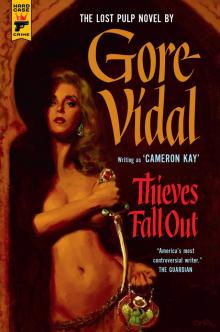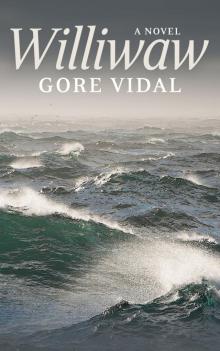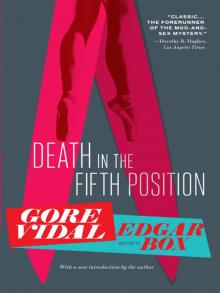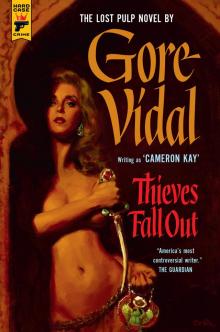- Home
- Gore Vidal
Williwaw Page 2
Williwaw Read online
Page 2
“Oh no, never mind. We’ll move on tomorrow.”
“O.K., be seeing you, Evans.”
Evans muttered that he had been pleased to meet them and left the room. As he walked down the corridor he wondered if Bervick would be able to understand the weather chart. He decided not.
Outside, the rain had stopped. The wind was cooler and more brisk. Evans walked toward a half-barrel-shaped hut: the weather office. Ravens glided heavily around him, their black feathers glistening bluely in the pale light. High above him he could make out an eagle flying northward.
Inside the weather office a Master Sergeant was handling the maps and charts. The weather officer had not come in yet.
“Hello, Mr. Evans.”
“Hello, has Bervick been here?”
“Yes, he just now left. I think he’s gone to get some paint over to Supply.”
“I see. What’s the deal on the weather?”
The Sergeant shuffled his papers. “It’s hard to say. If the wind shifts around to the north, and it looks like it will, you’ll be fine.”
“Is there much wind outside the harbor?”
“There’s some.”
“Much wind? Thirty mile an hour? Is it more?”
“Damned if I can tell. You’re leaving tomorrow, aren’t you?”
“That’s right.”
“Well, I’ll check with the Navy boys and get in touch with you later. This isn’t a good month for traveling the Chain.”
“I know. Is that the weather chart you got there?”
“Yes.” The Sergeant pushed the chart at him. Evans pretended to study it. Actually he knew very little about reading these charts. He knew from practical experience, though, that they were often wrong.
“It’ll probably be rough, Mr. Evans.”
“That’s nothing new. You say Bervick’s at Supply?”
“I think so.”
“O.K., and thanks a lot. I’ll see you when you have some more dope.” Evans went out. He stood for a while watching the power barges, blunt-nosed and slab-like, move back and forth across the harbor. There were rumors that the port of Andrefski was to be closed soon and only the inland air base would be kept going. Many men had already been moved out, only a few hundred were left now. On the rocky, moonstone and agate littered beach, lumber was piled, waiting to be loaded on the Liberty ship, edged grayly against the main dock. This ship was the largest in the harbor and it made the other boats look like toys in a bathtub.
A jeep, with an awkward plywood body tacked onto it, rode by and splashed him with mud from the side of the road. Evans swore at the driver. Then he walked along the road, keeping close to the pebbled embankment. There was quite a lot of traffic at this time of day.
The Supply warehouse was large and gloomy and empty-looking. He walked around to the side of the building and went inside. He could hear Bervick’s voice. “Come on, you can give us six gallons. Christ, you have the stuff piled up all around.”
Another voice answered, “Sorry, three’s all you get.”
“Why that’s....” Evans walked up to them. Bervick was holding three gallon cans of paint.
Evans grinned, “That’ll do us fine, Bervick. Are you through here?”
“I guess so.”
“Well, let’s get on back to the ship.” Bervick picked up two of the cans and Evans took the other.
A thin drizzle was beginning to cloud the air.
“Nice day,” said Bervick.
“Yes, nice day. All days are nice here. We go to the Big Harbor tomorrow.”
“And from there to Arunga?”
“That’s right. We got some rank to carry.”
“Who? I heard the Chaplain might come.”
“That’s a new one. I hadn’t heard about him. We’ve got a Major who is the Adjutant at Arunga, and a Lieutenant.”
“Any cargo?”
“Some for the Big Harbor. That’s all.”
They walked along the road, their feet grinding the wet cinder-like surface. Sea gulls circled high above them, a sign of bad weather according to the Indians. Among the sharp rocks the ravens croaked drearily. Silently they walked back to the ship.
Two of the men were hosing down the deck. The sea water from their hoses made a drumming sound as it shot across the decks.
Evans was surprised. “The first time they’ve ever done this without being told.”
Bervick laughed, “The crew knew we were going before you did.”
“They usually do.”
They climbed aboard. Bervick went aft with the paint. Evans opened the door to the dining salon and stepped inside.
The Chief, sitting on one of the tables, was smoking a cigar. Down the companionway, Evans could see the two assistant engineers working on the auxiliary.
“What’s new, Skipper?” asked Duval.
“Hello, Chief. Your boys pretty busy?”
“Yeah, getting ready for the big trip. Lucky we took fuel last week.”
It was.
“When we leaving?” The Chief asked one of his few direct questions.
“Tomorrow morning.”
“Straight to Arunga, I suppose.”
“No, we’re going to the Big Harbor first. We go on from there.”
“I guess I’ll be able to see Olga then.” The Chief grinned.
Evans looked at him. “What about Bervick?”
“What about him?” The Chief was not interested and they said nothing for a few moments. Then he said, “I hear the Chaplain’ll be with us.”
“So I’ve heard. I guess the Captain will tell me about it later.”
“Probably. I got to get to work.” The Chief slid off the table and walked toward the engine room. Evans could hear the sound of his voice as he talked with his assistants. Evans knew he was telling them that they were going west to Arunga as he had said they would. Evans walked into the galley. The cook, John Smith, was scrubbing pans. He was alone in the galley.
“How’s it going, Smitty? Where’s your helper?”
Smitty put down the kettle he was scrubbing. “Gone,” he said with suppressed drama. “I seen everything now.
What does this guy do? Does this guy help in here? No. He go down and lay on his fat butt. I’m going to get off this boat. I seen everything. He won’t work, won’t do nothing....”
“I’ll talk to him, Smitty.” That was always a good promise to make. Smitty would be mad at something else the next day anyway. “By the way,” he added, “have you got enough rations to get us to Arunga? We’re going to have three passengers.”
Smitty gasped. His lean ugly brown face was contorted with grief. “I seen everything now.” He spoke softly as if he were praying. “I got no bread. I got no meat. I got no nothing now. How,” his voice rose to a wail, “how am I going to feed the crew? I make no bread on the water. They eat out of cans, that’s all.”
“Well, you work it out and get what you need. We’ll leave tomorrow at eight.”
Smitty muttered to himself. Evans went up to the wheelhouse.
Bervick was standing over the chart table: a chart of all the islands in the Aleutian Chain before him. He was squinting thoughtfully and carefully measuring out a course.
“Think you can get us there?” asked Evans.
“What? Oh sure, I was just checking the old course. Last time we ran too close to shore off Kulak.”
“I remember. We’ll work out a course over at the Big Harbor.” The salt spray from the hoses splattered the wheelhouse windows. “That reminds me, you better get some water. We’re pretty low.”
“O.K.” Bervick put the chart in a drawer under the table and left the wheelhouse.
Evans looked out the window. He could think of nothing very important to be done before they sailed. They had fuel. Smitty would get rations. The charts were up to date. He rubbed his face to see if he needed a shave. He did.
Evans went into his cabin and turned on the water in his basin. He noticed that his eyes looked a little bette
r, though they still hurt him. He sighed and tried to look at his profile in the glass. This he knew would exercise his eyes, also in the back of his mind he wondered if he might not be able to see his profile. He had seen it once in a tailor’s three-way mirror. He had been greatly interested, and he hoped vaguely that he might see it again sometime. Strange things like that obsessed people who had been to sea for a long time.
Someone turned on the radio. A deep sterile radio voice staccatoed in the air for a moment and was gone. The air was filled with static, and then the voice came back again. Evans could not make out what the voice was saying but he could guess from the tone that our “forces were smashing ahead on all fronts”: the usual thing. He was bored by the war.
Methodically he shaved himself. He wondered who had turned on the radio. Probably Martin, his first mate.
A light wisp of fog came into the room through the half-open window; quickly Evans shut it. He shivered. The cold was penetrating.
“I’m cold as gold is old,” he muttered to himself. It was a jingle that went occasionally through his mind. For several years he had known it. Queer phrases and jingles often came to him when he had been too much alone. Sometimes they worried him. Evans often wondered if he might not be a little crazy. They say, though, that when you are crazy you never know it, he thought. There was consolation in that and he murmured again to himself, “I’m cold as gold is old.” Then he finished shaving.
He looked much older than twenty-five, he noticed, looking at himself intently in the mirror. When he was eighteen he had worked alone in a lighthouse. He used often to look at himself in the mirror then. He felt less alone when he did that and the habit had stayed with him. He yawned and turned away from the mirror. Neatly he put his shaving equipment away, then he sat down at his desk and looked at the papers on it. Most of the papers were memorandums from the Headquarters. He pushed them to one side.
In his desk drawer was a quart of bourbon. He wondered if he should take a swallow, a small one, enough to take away the ache behind his eyes. Evans reached for the drawer. Before he could open it, Martin walked into the cabin. Martin never knocked.
“Good morning,” said Evans and he tried to sound sarcastic.
“Hail to the Chief,” said Martin, eying Evans’ hand on the liquor drawer. “Starting in early, aren’t you?”
“What do you mean? Oh, this,” Evans withdrew his hand quickly. “I was just looking for something.”
“So I see.” The first mate smiled, showing all his teeth. He was a year younger than Evans, but looked even younger than he was. He had a carefully studied collegiate manner though he had never been to a college. John Martin had been one of the numerous unpromising young actors in a New England stock company. He was dark and nearly handsome. His voice was deep, interesting and mocking. He knew nothing about being a mate.
“Did you just get up?” Evans asked, knowing that he had.
“Why yes—the party, you know. I felt I should sleep. The ravell’d sleave, you know.” He spoke with a pseudo-British accent which he knew irritated Evans.
“Well, go get on down below and make sure they take water,” Evans snapped.
“Right you are, sir.”
“Can the funny stuff. We’re going to the Big Harbor tomorrow.”
“Any passengers?”
“Yes, the Adjutant at Arunga, a Lieutenant and the Chaplain.”
“That sounds gay. When’re we going to haul another group of USO girls?” Martin winked in what he would have called a roguish manner. Evans had once become too interested in a USO girl on tour.
Evans murmured, “Not for a while.” He turned away and played with the papers on his desk. He tried to think of something for Martin to do. “You might,” he finally said, “go see the Chaplain and find out when he’s coming aboard. Also, you’d better get hold of a copy of the special orders with his name on them. The Captain forgot to tell me he was going.”
“Fine.” Martin started to go. “By the way,” he said, and Evans knew and dreaded what he was going to say, “how do you feel after the party last night? You don’t look so good.”
“I feel awful. Now go get to work.”
Martin left and Evans rested his head on his arm. He felt tired. The ship was unusually still. Far away he could hear the rasping croak of a raven. He opened the desk drawer.
ii
John Martin walked into the galley.
“What’s on your mind, Smitty?” he asked. Martin was always polite with the men and Evans was not. The men liked Martin better and that was the main reason why Evans did not like him, or so Martin thought.
“Nothing on my mind. You want to eat something?”
“No thanks. I’ll just take a little of this.” He poured himself some pineapple juice from a large can. Smitty watched him drink it.
“What’s on for chow tonight?”
The Indian’s eyes gleamed. “Vienna sausage and that’s all I got. I have to go get rations for a whole week now. I haven’t got no time to make bread or nothing. That guy,” he pointed upward, “he tell me just today to get this stuff.”
“Well, that’s O.K., Smitty,” Martin murmured soothingly, as he left, “it’ll be all right.”
On deck he found two of the crew coiling the long black water hose.
“Pretty empty, wasn’t she?”
One of them nodded. He was a heavy blond fellow, a professional seaman. “Are we going out west?” he asked. “That’s right. Leaving tomorrow.”
“That’s what Bervick said. We didn’t know what he was bulling or not. Weather don’t look bad.”
Martin looked at the pale sky. “You can’t ever tell,” he said.
“No, you can’t.” They went on coiling the hose.
Martin walked across the dock. He watched lumber being loaded onto the Liberty ship by sailors with heavy fantastic beards. The port was slowly closing down and he, for one, was not sorry. For a year now he had been at Andrefski as a first mate. He had fought constantly with Evans and he had known all the time that Evans was right: that he was no seaman. Martin had drifted into boat work in the army. After two years he had been made a Warrant Officer and assigned to this Freight-Passenger ship. The whole thing was unreal to him, the Bering Sea, these boats, the desolate stone islands. He wished he were in New England and the thought that he would be at least another year in these islands was maddening.
Thinking of these things, he walked to the warehouse where the mail was delivered. A door in the warehouse opened and Bervick came out. He carried a bundle of letters in his hand. “Hello, Johnny,” he said. “You up so soon?”
Martin smiled. There was no formality between them. Living together in the same small stateroom they understood each other well. “I thought a run in the fog would be just what I needed. Got something for me?”
Bervick thumbed through the bundle and handed Martin a letter. “How does it smell?” he asked.
Martin inhaled the perfume that had been sprinkled on the envelope. “Like magnolias,” he said.
Bervick sniffed. “Smells like a Ketchikan whore to me.”
“Careful,” said Martin, “speak softly when you speak of love. Which reminds me, when are they going to load cargo?”
“Right after lunch, I suppose. That’s if the longshoremen can get together long enough to do some work.”
“Then you’d better move the boom over.”
“O.K.” Bervick walked away.
Martin stepped inside the warehouse. Standing close to the door—there was almost no light in the building—he read the perfumed letter. She thought a lot about him. She wondered how he was. She did not go out much. She wished he were back. She did not go out much, she repeated that. She wondered if he remembered when...Martin folded the letter and put it in his pocket. Her letters were always the same but she was a nice girl and he would probably marry her and be bored. He felt sorry for himself. He looked at the bleak sky and saw that it suited his mood.
A blast of damp a
ir came through the door and he buttoned his parka at the throat. Then, remembering his errand with the Chaplain, he walked out into the gray light.
A mile away on a slight mound was the post chapel. It was like all other army chapels: box-shaped, with a short square tower and spire. The building was brown and looked dingy from camouflage. He walked toward it.
The wind blew at his back. The wind was rising and there were whitecaps in the bay. Gulls flew worriedly in the bedrizzled air.
A jeep went by him on the road. It stopped and he climbed in. The Captain was sitting at the wheel, his pipe firmly between his teeth.
“How’s the boat business, Martin?” he asked cheerfully.
“Fine as ever.”
“Good.” He started the jeep. “Where are you headed?”
“Over to see the Chaplain. I hear he’s coming with us.”
“Damn! I knew I forgot to tell Evans something. The Chaplain’s going with you people. They’re having a meeting at Arunga and he’s already on orders. Does Evans know?”
“Yes, he heard about it.”
“Grapevine,” the Captain muttered. “I’m going as far as the Post Exchange. You want out there?”
“That’ll be fine.”
The Captain drove deliberately and in silence over the road. After a few minutes he stopped in front of a long low building and they both got out. They walked into the Post Exchange.
“You getting on all right with Evans?” the Captain asked.
“Sure, we’re coming along fine,” Martin said, trying to sound sincere and succeeding.
“That’s the way things should be. I’m glad to hear it.”
The Post Exchange was not yet crowded. A long counter ran the length of the building and behind the counter there were shelves of candy, stationery, toilet articles, magazines....At one end of the building was a barber’s chair and a soldier barber, and at the other end was a Coca-Cola machine. Everything was neatly arranged beneath hard bare electric lights.
Martin bought a lurid Love magazine. Nothing else caught his eye and he left.

 The Golden Age: A Novel
The Golden Age: A Novel Death Before Bedtime
Death Before Bedtime Burr
Burr The Last Empire
The Last Empire Empire: A Novel
Empire: A Novel The Selected Essays of Gore Vidal
The Selected Essays of Gore Vidal Live From Golgotha
Live From Golgotha Lincoln
Lincoln Death Likes It Hot
Death Likes It Hot Thieves Fall Out (Hard Case Crime)
Thieves Fall Out (Hard Case Crime) Point to Point Navigation
Point to Point Navigation Williwaw
Williwaw Death in the Fifth Position
Death in the Fifth Position In a Yellow Wood
In a Yellow Wood Julian
Julian Hollywood
Hollywood Myra Breckinridge
Myra Breckinridge Messiah
Messiah The Second American Revolution and Other Essays 1976--1982
The Second American Revolution and Other Essays 1976--1982 Homage to Daniel Shays
Homage to Daniel Shays Empire
Empire Thieves Fall Out
Thieves Fall Out 1876
1876 The City and the Pillar
The City and the Pillar The Golden Age
The Golden Age At Home
At Home